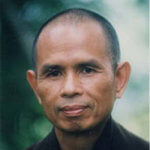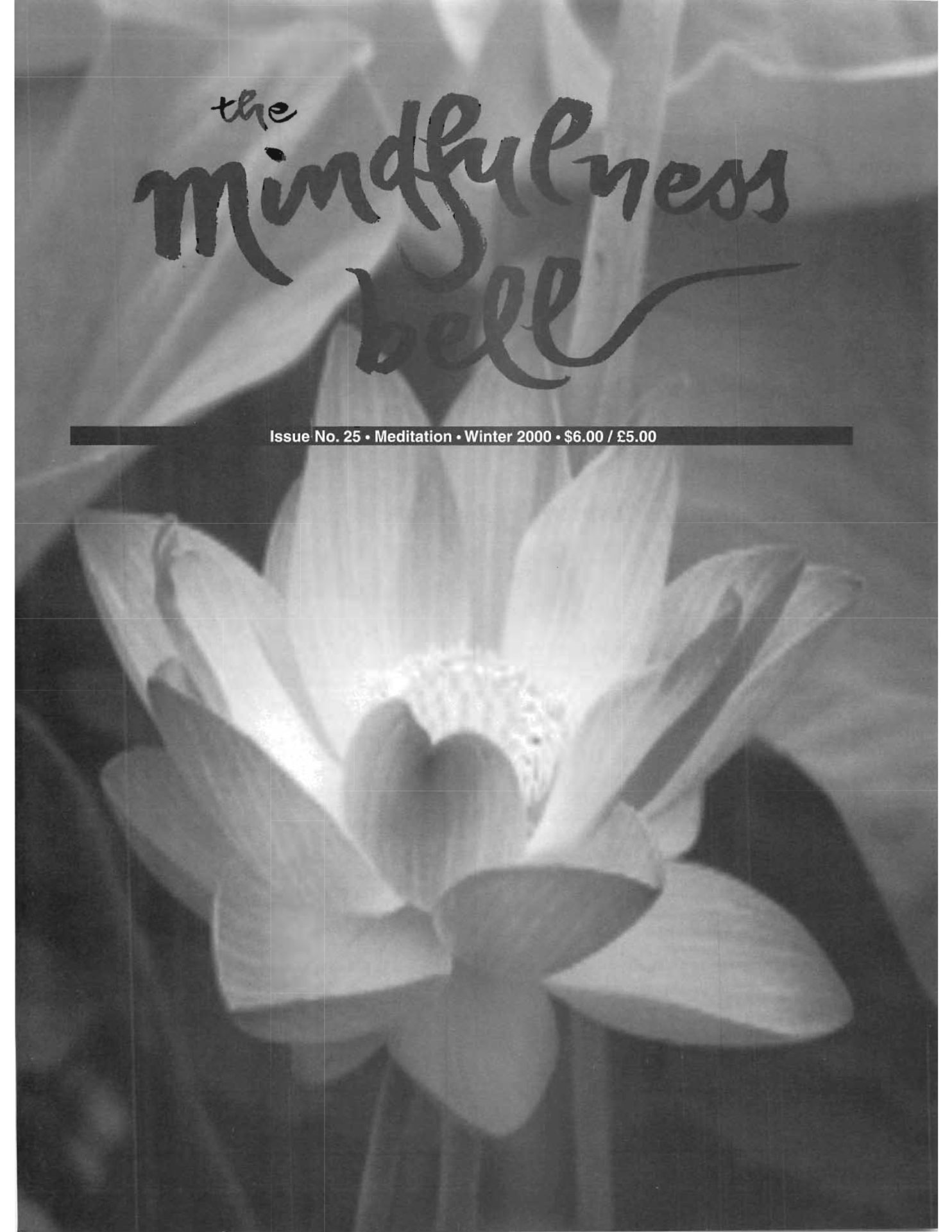By Thich Nhat Hanh in January 2000
A Message from Thich Nhat Hanh November 2 , 1999 Plum Village, France
Sharing a Practice
Twelve years ago, at a retreat in Montreal, a lady told me after the first session of walking meditation practice, “Thay, it is wonderful to walk this way. I have never felt relaxed and happy like this before when I walked.
By Thich Nhat Hanh in January 2000
A Message from Thich Nhat Hanh November 2 , 1999 Plum Village, France
Sharing a Practice
Twelve years ago, at a retreat in Montreal, a lady told me after the first session of walking meditation practice, "Thay, it is wonderful to walk this way. I have never felt relaxed and happy like this before when I walked. Would you allow me to share this practice of mindful walking with my friends at home?" I looked at her and smiled: "Why not?" It is wonderful to share your practice with others, when the practice brings you joy and well-being. We should be able to share the Dharma, and by doing so, we build a Sangha, a community of practice. When we have a Sangha, we have a refuge, and many others will also profit from that Sangha. Sharing the practice can be a great joy. It helps other people. And it helps us. Naturally we want to learn more, and to practice more in order to be able to share more.
The Meaning of "Lamp Transmission"
The Dharma can be transmitted continuously in each moment of the day. By practicing, the teachers and the sisters and brothers in the Dharma are already transmitting the Dharma every minute of their life. Very often the Dharma is transmitted without verbal expressions. We do not need an "authorization" to share the Dharma. The "Lamp Transmission" Ceremony performed in Plum Village is not an authorization to teach the Dharma; it is only an encouragement, a support, and an empowerment.
Sangha-Building
If you have joined in one or more retreats of mindfulness practice, you may like to organize and lead a Day of Mindfulness or a small retreat by yourselves or with other experienced practitioners in order to share the Dharma, and to practice with others. And you may like to receive further training or attend other retreats of mindfulness to learn more, to improve the quality of your practice and your skills in organizing and leading a retreat.
Organizing a retreat and practicing with others is a wonderful way to build a Sangha. Sangha-building is the noblest thing for us to do. Everyone needs a Sangha to continue and get support for his/her practice. Without a Sangha, one can abandon one's practice after a few months of practicing alone. The Sangha is like a boat carrying us and preventing us from sinking into the river of suffering, because the Sangha contains also the Buddha and the Dharma.
The Five Mindfulness Trainings are also powerful tools for Sangha-building. The Five Trainings are the most concrete expression of the practice. They are the basis for individual and collective transformation and healing. Everyone in the Sangha should be encouraged to receive the Five Trainings and bring them into his or her daily life. On Days of Mindfulness and in mindfulness retreats, it is beneficial to recite the Five Trainings and to organize Dharma discussion to deepen our understanding of the Trainings and to help us know how to apply them better.
True practice can bring a lot of relief and joy and nourishment. Suppose your Sangha has fifteen members and you would like to call it by a name, like Lotus Seeds Sangha. You may like to use a letterhead with the following: Lotus Seeds Sangha A Community of Mindful Living Address Phone Number/Fax/Email
Communities of Mindful Living Network
There will soon be thousands of Communities of Mindful Living like yours in many countries, and people who live in your area may find you and join your Sangha through the Internet or through The Mindfulness Bell magazine. What characterizes a Community of Mindful Living or a Mindfulness Practice Center is the practice of the Five Mindfulness Trainings. We cannot call our community a Community of Mindful Living or a Mindfulness Practice Center if we do not live according to the Five Mindfulness Trainings.
The Mindfulness Bell magazine will continue to be a great support for Sangha-building, sharing information about the practice and the worldwide Sangha.
From time to time you may like to co-organize a larger retreat with other Communities of Mindful Living in your region. You may like to invite a Dharma Teacher through the Communities of Mindful Living Network, because there is now a Coordinating Council of the Communities of Mindful Living. The Council has an office in Albany, California, and you can contact the office in order to seek help with planning, materials, training, information, teachers, and other matters.
We have opened a new Dharma door called a Mindfulness Practice Center to introduce the practice to as many people as possible in a nonsectarian manner. You may want to contact the Mindfulness Practice Center Association and explore initiating a Mindfulness Practice Center in your city, institution, or workplace.
The Order of Interbeing
If you are an ordained member of the Order of Interbeing, your task is to build a Sangha and support the practice of the Sangha. Your Sangha can be called a Community of Mindful Living. Those of us who have formally received the Fourteen Trainings are members of the Core Community of the Order of Interbeing, and all others are members of the extended community of the Order. You may like to invite everyone in your Sangha to come and participate in the recitation ceremony of the Fourteen Mindfulness Trainings. Members of the Core Community of the Order of Interbeing are expected to keep sixty days of mindfulness a year, be active in Sangha-building and organizing Days of Mindfulness and mindfulness retreats.
There will soon be a Council of the Order of Interbeing forming in each country or region. We may get in touch with this Council to get the support we need. The dates for Days of Mindfulness and retreats can be set up one year in advance, and practitioners can have access to this information through the Internet or The Mindfulness Bell magazine.
The Institute of Mindfulness Training located at Green Mountain Dharma Center in Vermont is a place where we can receive more intensive training in the practice of mindfulness. The Head of the Institute is Sister Annabel Laity, Abbess of the Green Mountain Dharma Center.
Parallax Press
Parallax Press will continue to be the primary publisher and distributor of Thay's books and of other books on socially engaged Buddhism. My hope is that Parallax Press will lead the way in showing others how our practice and our work lives can be integrated, that Parallax Press will succeed in being both financially viable and a center of practice.
The Unified Buddhist Church
The Unified Buddhist Church (UBC) was founded by Thay in 1971 to serve as the legal and financial entity behind Dharma projects such as the Vietnamese Buddhist Peace Delegation (1971-76), Sweet Potatoes Community (1976-82), the boat people rescue project (1976-1989), Plum Village (1982-Present), and the organization of retreats in Europe, Asia, and Australia (1983-Present). In 1998, the UBC was incorporated as a church in the United States to provide a focus for the expanding network of Dharma projects, such as the Green Mountain Dharma Center, Parallax Press, and the Communities of Mindful Living. The UBC is guided by a Board of Directors that include Thay, monastics, and a lay Dharmacarya.
The following names and addresses may be useful:
Unified Buddhist Church Board The Ven. Thich Nhat Hanh (Plum Village) Sister Chan Khong (Plum Village, New Hamlet) Brother Phap An (Plum Village, Upper Hamlet) Sister Thoai Nghiem (Plum Village, Lower Hamlet) Sr. Chan Due, Annabel Laity (Green Mountain Dharma Center) Sr. Thuc Nghiem, Susan (Green Mountain Dharma Center) Dharmacarya Anh-Huong Nguyen (MPC of Fairfax, Virginia)
Plum Village—New Hamlet Martineau 13, 33580 Dieulivol, France Tel:(33)5 5661 8418 or (33)5 5661 6688 Fax:(33)5 5661 6151
Plum Village—Lower Hamlet Meyrac, 47120 Loubes Bernac, France
Plum Village-Upper Hamlet Lepey, 24240 Thenac, France
Green Mountain Dharma Center and Maple Forest Monastery P.O. Box 182 Hartland-Four Corners, Vermont 05049, USA Tel:(802)436-1103; Fax:(802)436-1101
Coordinating Council of the Communities of Mindful Living (For information about local Sanghas, The Mindfulness Bell, the Order of Interbeing, and Mindfulness Practice Centers) P.O. Box 7355, Berkeley, CA 94707, USA Tel:(510) 527-3710; Fax:(510)525-7129
Parallax Press P.O. Box 7355, Berkeley, CA 94707, USA Tel:(800)863-5290 (Book orders); (510)525-0101 (Other calls) Fax:(510)525-7129; email:parapress@aol.com


